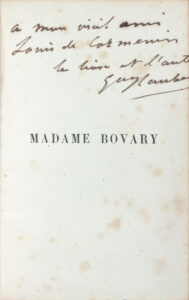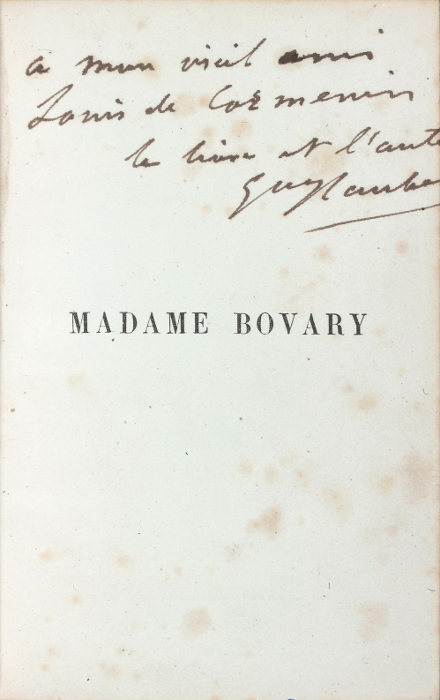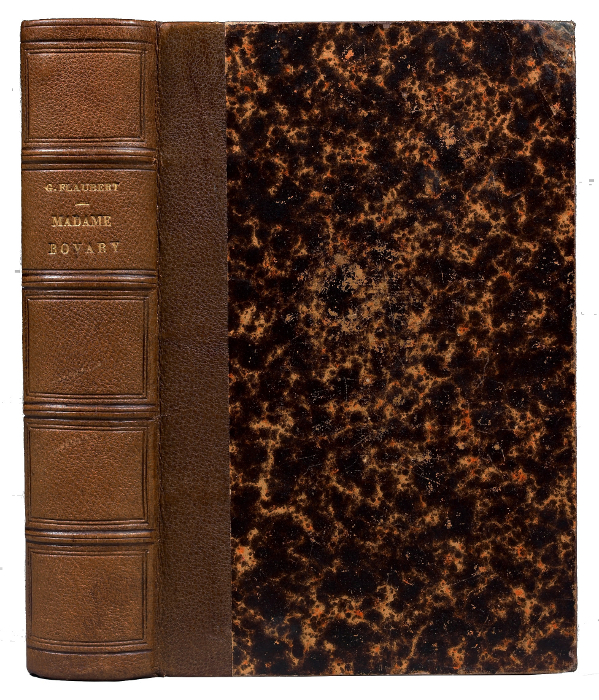FLAUBERT, Gustave. Madame Bovary- Mœurs de province-
Paris, Michel Lévy frères, 1857.
2 parts in 1 volume 12mo [172 x 115 mm] bound in 19th century brown half-shagreen, spine ribbed slightly faded. A few pale foxings.
First edition of Flaubert’s masterpiece, one of 78 copies on thick vellum paper.
Carteret, I, 263-266; Vicaire, III, 721-723.
A whiff of scandal surrounds this publication but the success is immediate and brilliant and the esteem of Saint-Beuve, Baudelaire and Zola immediately obtained.
« When Madame Bovary was published, there was an absolute literary revolution. » Zola
This great intimist and realistic novel was about to deeply mark the literary world and to lead the novel towards new ways.
This copy, from the very first state, bears the mistakes indicated by A. Lambiotte.
Large-paper copies were sewed in 1 volume. They contain only one title-page and 28 signed quires. The name of the printer does not appear at the bottom of page 232, nor the title « Madame Bovary » upon « Deuxième partie ».
50 of the 78 copies had been reserved for the author. Fernand Vanderem is surprised that the editor granted some large-paper copies to Flaubert, a writer making his début, this favor being generally reserved « to the accomplished writers, to please them ».
This one was offered by Flaubert to his friend Louis de Cormenin, with the dedication signed: « A mon vieil ami Louis de Cormenin, le livre et l’auteur, Gustave Flaubert» on the half-title (dedication trimmed in the right margin).
This copy is unknown to Auguste Lambiotte.
Louis Marie de Lahaye Cormenin (1788-1868) is a French legal expert, an adman and a politician. Close friend to Maxime Du Camp, he was one of the founders of the Revue de Paris in 1851, in which Madame Bovary was first published, from October to December 1856. Flaubert published his novel in this review because Maxime Du Camp, his friend, was a member of it. The literary history generally remembers the date of 1857, the year the action of the Director of the Public Prosecutions was brought against the directors of the Revue de Paris, in January-February, and of the publication in volume by Michel Levy, in the course of April; but the moral and literary scandal broke out in the last trimester of 1856.
« In the fifth part, the one of December 1st, Du Camp demands a clean cutting down of the text […]. The Revue running the risk of the suppression, Flaubert accepts the sacrifice of the scene, in return for a note signed “M.D.” admitting the cutting down of a passage to the author. In the name of this same property, the Revue dictates the deletion of three additional passages in the last part, dated December 15th […].
In a note, the author curtly protests against the deletion made in the name of moral and accepts no liability of such a fragmented work.
This note of the author, added to the one by Maxime Du Camp, at the bottom of the pages of two successive issues, surely drew the attention of the Director of the Public Prosecutions.
For Flaubert, the year 1856 ends with two events full of threats and promises: on December 24th he signs the contract with Michel Levy; on the 27th, a letter from Du Camp informs him that the preliminary investigation is open.» (Yvan Leclerc, professr at the university of Rouen)
Here is how Louis de Cormenin, greatly involved in the publication of Madame Bovary, comments the publication of this novel by Michel Levy.
« The publication in volumes of Madame Bovary is the sensation and the event of the literary world. We remember that the novel, published at first in the Revue de Paris, had brought the intimidation of the public prosecutor, and that thanks to Mr. Sénart eloquent speech of the defense, he had been discharged […]. Around the figure of Madame Bovary, risen above the gossip, but so tender, so supple and so feminine, endowed with the charm and the seductions of the forbidden fruit, the author outlined twenty portraits with a sharp line, so lively that they pass in the street. This entire world is observed, seized… They are not commonplaces copied from books nor lay figures wearing tatters, but beings of flesh and blood […]
It is always a great joy for us to point out an out of the line work, and we are sure that Madame Bovary will last, because after its reading, we will soon realize that Balzac left an heir, Gustave Flaubert; remember this name, it is one of a name we shall not forget. »
(Louis de Cormenin, Journal du Loiret, 6 mai 1857).
A precious large-paper copy with dedication coming from Louis de Cormenin (dedication) and Jacques Dennery’s (ex libris) collections.



